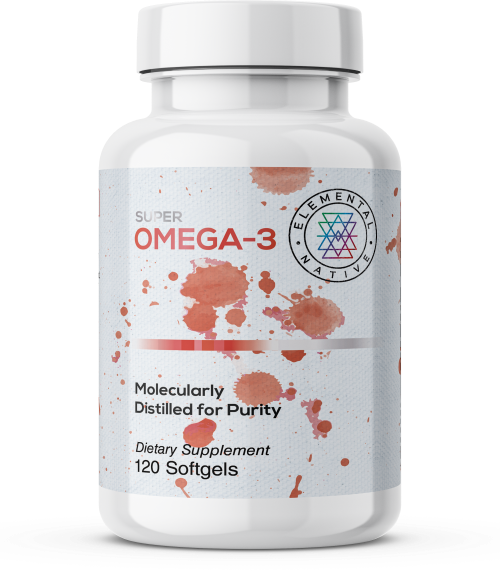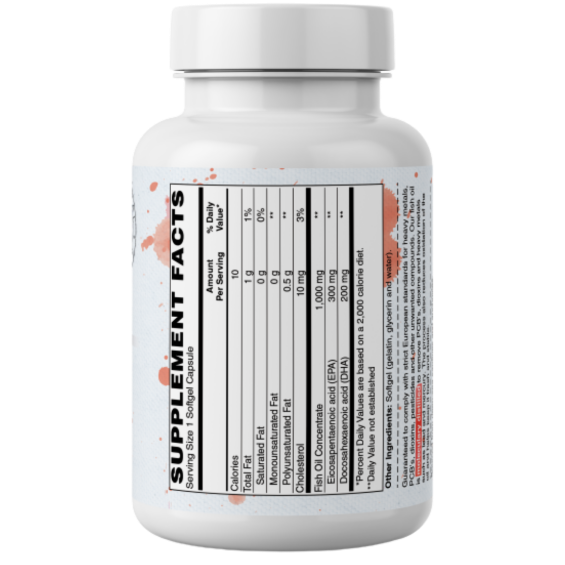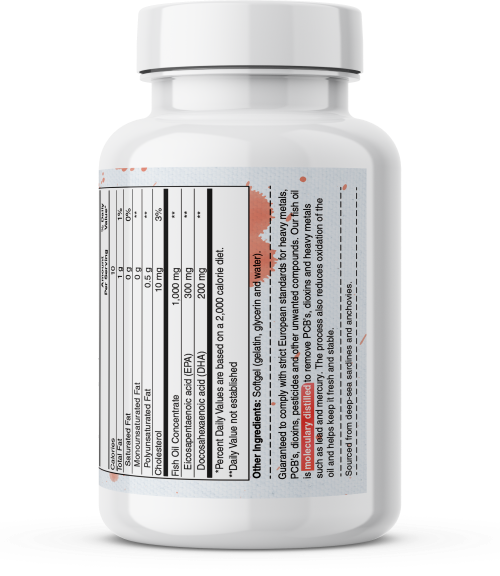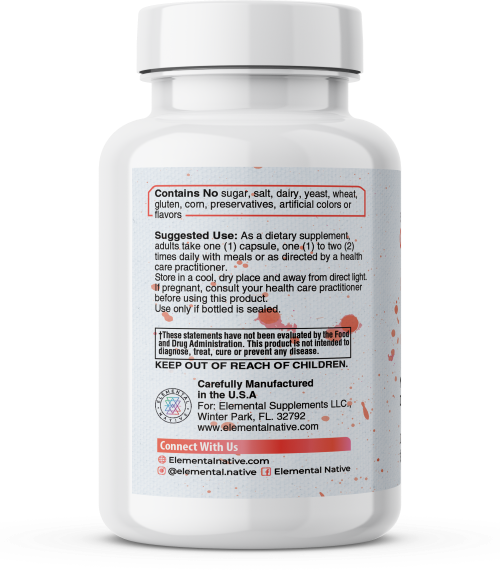-
DETAILS
Omega-3 fatty acids are a type of fat that the body requires for survival but is unable to produce on its own. It is, therefore, extremely important to get enough of these vital nutrients in your diet. There are three different types of Omega-3s. The first two types, eicosapentaenoic acid (EPA) and docosahexaenoic acid (DHA), are found mainly in fish.*
Every cell in your body needs omega-3s, especially the eyes and brain. Omega-3s are also important for muscle activity, immune function, digestion and fertility.*
Most of the research on omega-3s has studied its heart health benefits. People who eat omega-3s in their diet have less plaque buildup in their arteries, lowering the risk of heart attack and stroke.*
Omega-3s lower triglyceride levels and raise ‘good’ HDL cholesterol levels.*
Plus some research suggests eating more foods rich in omega-3 fatty acids, like fish, may have lower risks of cognitive function problems, like Alzheimer’s disease and dementia.*
-
DIRECTIONS
Suggested Use:
As a dietary supplement, adults take one (1) capsule, one(1) to two (2) times daily with meals or as directed by a health care practitioner.
-
WHAT'S IN IT
Omega-3, 1000mg high potency fish oil concentrate.
Contains 300mg of eicosapentaenoic acid (EPA), and 200mg of docosahexaenoic acid (DHA).
Fish oil is molecularly distilled to remove any potential toxins.
Sourced from deep-sea sardines and anchovies.
Fish oil complies with strict European standards for heavy metals, PCB’s, dioxins, pesticides, and other unwanted compounds.
 Non GMO
Non GMO Hormone free
Hormone free Gluten free
Gluten free Dairy free
Dairy free Keto
Keto Paleo
Paleo 0 Sugars
0 SugarsKEY INGREDIENT
Omega-3
High potency omega-3 fish oil.
- with 300mg of EPA and 200mg of DHA
Numerous studies demonstrate the benefits of the omega-3 fats EPA and DHA. DHA is important for the structure and function of cell membranes, particularly those of the nervous system.* DHA is critical for normal, healthy brain structure and function.* EPA is found in small amounts in the brain, but is required for numerous regulatory functions throughout the body. EPA helps support a healthy inflammatory response and optimal cardiovascular function.* Cardiovascular benefits of omega-3’s include the ability to support a normal, healthy heartbeat, normal blood clotting, and healthy blood triglyceride levels.*

SUPER OMEGA-3 BENEFITS
-
1. PROMOTES
HEALTHY CHOLESTEROL -
2.SUPPORTS
HEALTHY BLOOD PRESSURE -
3.FIGHTS
INFLAMMATION -
4.SUPPORTS
MENTAL HEALTH -
5. SUPPORTS
ARTHRITIC JOINTS -
6.SUPPORTS
BRAIN + NERVE HEALTH
-
Triglycerides are a kind of fat within the bloodstream. High triglyceride levels (200 mg/dL or above) can cause narrowing of the arteries and an increased risk of heart attack or stroke. About 25 percent of adults in the United States have a triglyceride level that is considered borderline high. Omega-3 fatty acids have been found to reduce blood triglyceride levels.*
-
Multiple studies report modest reductions in blood pressure in people who take fish oil supplements. There's some evidence that the beneficial effects of fish oil might be greater for people with moderate to severe high blood pressure than for those with mild blood pressure elevation.*
-
Long-term inflammation can contribute to almost every chronic Western illness, including heart disease and cancer. Omega-3 fatty acids can reduce the production of molecules and substances linked to inflammation, such as inflammatory eicosanoids and cytokines. Studies have consistently observed a connection between higher omega-3 intake and reduced inflammation.*
-
Omega-3 fatty acids can help reduce depression and anxiety. Studies indicate that people who consume omega-3 fatty acids regularly are less likely to be depressed. What’s more, when people with depression or anxiety start taking omega-3 supplements, their symptoms improve.*
-
Studies suggest omega-3 fatty acids can help reduce pain, improve morning stiffness and relieve joint tenderness in people with rheumatoid arthritis. While relief is often modest, it could be enough to reduce the need for anti-inflammatory medications.*
-
Omega-3 fatty acids are necessary for healthy brain and eye development in utero, postnatal, and into early childhood. Adequate levels of DHA make it easier, quicker, and more effective for nerve cells to communicate. Fatty acids make up the outer membrane of nerve cells, as well as the myelin sheath, the protective casing that surrounds our nerves. Damage to the myelin sheath can result in symptoms of vision loss, muscle weakness, muscle spasms, and loss of coordination. Omega-3s have been found to aid in the regrowth of the myelin sheath and even restore nerve function in some cases.*



















